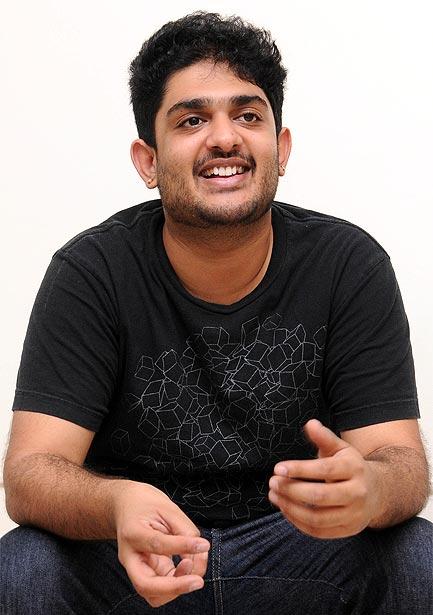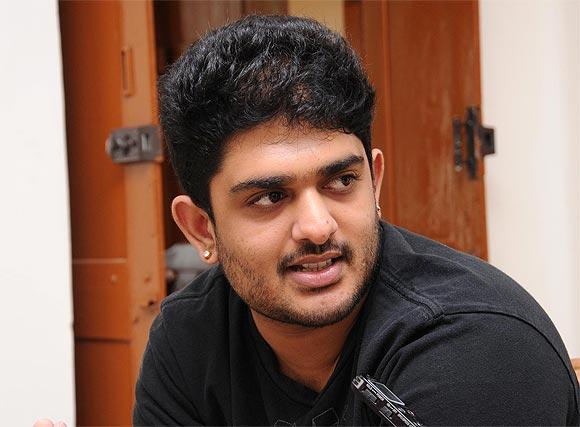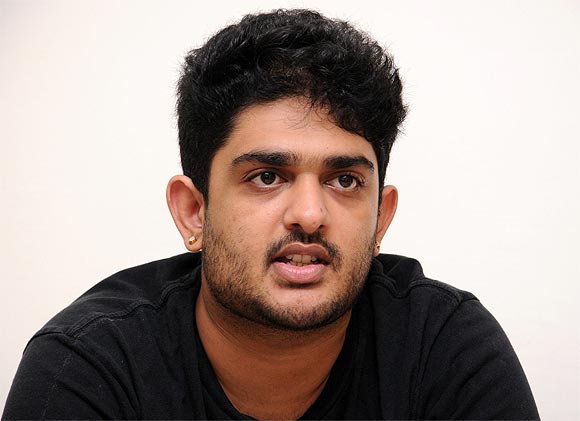Photographs: Sreeram Selvaraj Shobha Warrier in Chennai
Sid Sriram's song Adiye in Mani Ratnam's Kadal, under the music direction of A R Rahman, has become one of the sensations of 2013.
The 22-year-old Sriram, who sings jazz, blues and Carnatic music equally well, has just graduated from the Berklee College of Music in the US.
For the last five years, Sid has been coming to Chennai during the margazhi season to give Carnatic concerts. This year has been special for him as his first Tamil playback song was released and also, he got to sing at the Kadal audio launches and a concert with Rahman.
Before he went back to the United States, the young singer spoke to Shobha Warrier on his musical journey.
How did you get interested in Carnatic music?
My parents moved to San Francisco from India when I was a year old. My mother, who is a Carnatic musician, started a school for children when I was around three, and I grew up listening to her teaching students.
I was always near her when she taught her students, and I started learning from her when I was four.
When we came to India, I continued learning as my grandfather also was a Carnatic musician. It became serious when I started taking formal advanced lessons from my guru, Padma Bhushan P S Narayana Swamy, at age 10.
Simultaneously, I started listening to jazz, blues, gospel music and R&B. It progressed from there and soon I was singing in school and winning prizes.'Being an Indian kid in USA, I was exposed to so many kinds of music'
Image: Sid SriramPhotographs: Sreeram Selvaraj
When did you decide to make music your profession?
When I was 11. I decided that music was what I wanted to pursue as a career. After 12th standard, Berklee College of Music was my attraction as it is a contemporary music school.
Was it tough to get into Berklee?
It is tough as they have a very low acceptance rate. After the application process, there was an audition, and for that, I went to Boston.
I had to sing two compositions, and I sang an R&B American song and an Indian classical. When I was accepted, I was very elated as their old students had a great track record.
How was the experience of studying at Berklee?
It was an amazing experience. I have just graduated after a four-year course. The years I spent there sculpted me into the musician I am today. When you are surrounded by talented musicians, you learn so much from them.
Before I joined Berklee, I was listening only to Indian classical, Indian film music, R&B, and some stuff on radio, but Berklee taught me to listen to all kinds of music. The school also encouraged us to experiment and that is how I started writing my own music.
What kind of music do you write?
I call it urban Indie pop; it's a mixture of R&B, Indie rock, Indian classical, some electronic and pop. It is mainly mainstream, and an eclectic mix of all the music I grew up listening to. Being an Indian kid in America, I was exposed to so many kinds of music.
'Rahman just showed me the melody and then asked me to sing'
Image: Movie poster of KadalHow much has learning Carnatic music helped you as a musician?
Immensely. As a singer, it has helped modulate my voice well as I practise daily.
The reason I come to Chennai during December is to give Carnatic concerts. I have been giving concerts for the last five years. That has helped me keep my voice in shape.
Carnatic music is an intellectual exercise as much as an artistic exercise for vocals. It has helped me to have a different perspective on American music.
What do you want to be, a singer or a composer?
Both. I am pushing three streams: my Carnatic music, payback singing, and my original music.
I have released two albums of R&B music. One was a live recording of six songs and another was a studio project of seven songs. I do all the arranging and sequencing and also singing.
How did playback singing for Rahman in Kadal happen?
Last year, I was here for the December season. I had sent him a demo of my original music through a friend of mine who was interning there.
One of the engineers from his studio asked for some more music, and I sent some more songs. I was then asked to come to the studio.
When I went there, Rahman Sir was there and I sang some songs, Carnatic music and my own music, and went back to the US.
After a couple of months, I was called to sing for Kadal.
How was the experience of recording a song like Adiye... for Rahman?
What was really special about the song was that it was a mixture of blues and gospel, and a first of its kind in Indian film music. There was also a Tamil folk element to it because of the lyrics.
The song was my type as I have been singing a lot of R&B and blues kind of music.
The session went on for four hours. Lyrics were a bit tough for me initially though I am used to singing Tamil kritis, but these were specific Tamil words.
He just showed me the melody and then asked me to sing. He was very encouraging, and we went on from one line to another. They were real high notes and I was not expecting to do such a song.
It was an amazing experience. At that time I was not sure whether it would be used in the film.
'Mani Ratnam didn't want my version of the song'
Image: Sreeram SelvarajIt seems Mani Ratnam didn't want your version at first and asked Rahman to sing it...
Yes, I heard that. AR Sir told me about it later. I hadn't met Mani Sir till I came this time. I met him at AR's studio.
Did he talk to you about the song?
Yes, he was very encouraging. Though he is a man of few words, when he does say something, it's very pointed.
He said, great job! Keep going!
Did you expect Adiye... to be the highlight of the album?
I didn't know what to expect. I was excited to sing the song as it was an innovative, fresh song and a genre of music that Tamil film music listeners were not accustomed to hearing. I was excited to know how people would react. And the response has been amazing.
'I have been listening to Rahman Sir's music since I was a kid'
Image: Sreeram SelvarajWho has give you the best compliment so far?
It is from Rahman Sir. He said in an interview that he liked my ability to sing both Carnatic and blues. Coming from someone like him, who is a musical genius and a living a legend, it is truly amazing.
Was playback singing on your agenda when you became a professional musician?
Not necessarily. I have been listening to Rahman Sir's music since I was a kid. It was always a dream of mine to work with him in any capacity. So, it was not as a playback singer per se. I just wanted to work with him, mentor with him, and so singing a song for him has been a dream come true.
How much could you learn from him as a singer and composer?
Immensely. As a singer, a lot, as the song is really high range. He told me, don't get comfortable and sing easy, push yourself. He also prefers emotional singing. It taught me whenever you sing you should get into the emotion of the song.
As a musician, I see him as a perfect example of various kinds of music coming together seamlessly. To be able to learn and watch him create was inspiring. It was only music that mattered to him.
To be able to perform with him was an amazing experience. I performed with him in Hyderabad and Chennai for Kadal and then a concert with him for Jaya TV.
What are your plans as a musician?
I want to continue playback singing especially with Rahman Sir. But I don't want to be branded as a playback singer alone. I want to be an artist who also sings. I will do Carnatic music, American contemporary stuff and film songs. They all inspire me and satisfy me in different ways.
Once I am back in the US, I will release my first full length album.





Comment
article